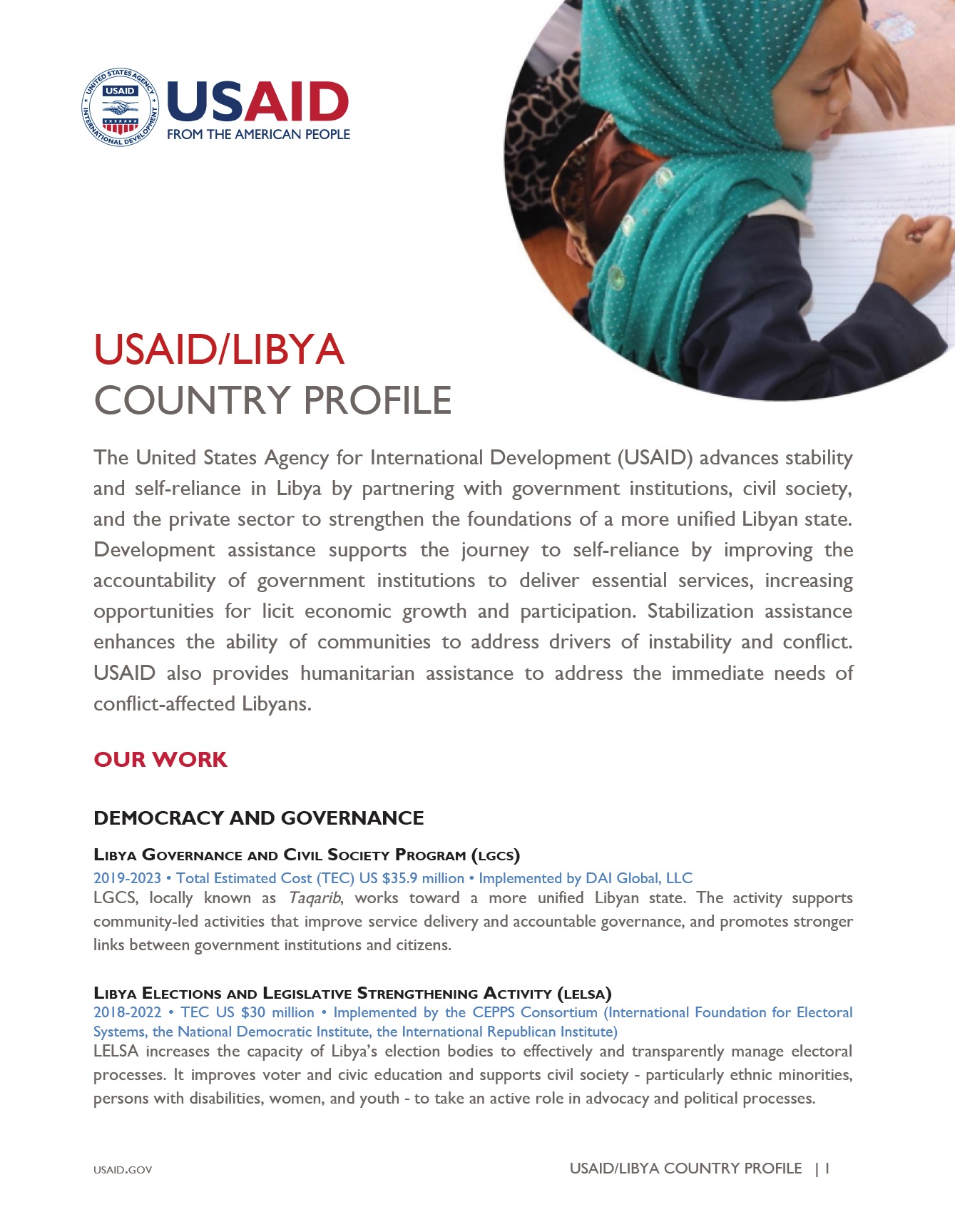Speeches Shim
Overview
USAID/Libya Country Profile ![]() (pdf - 429k)
(pdf - 429k)
The United States Agency for International Development advances stability and self-reliance in Libya by partnering with government institutions, civil society, and the private sector to strengthen the foundations of a more unified Libyan state. Development assistance supports the journey to self-reliance by improving the accountability of government institutions to deliver essential services, increasing opportunities for licit economic growth and participation, and enhancing the ability of communities to address drivers of instability and conflict. USAID also provides humanitarian assistance to address the immediate needs of conflict-affected Libyans.
Programs
Democratic Transition
Despite the political conflict, USAID continues to provide an array of targeted assistance to build support for and enhance confidence in a stable, democratic Libyan government. This includes support for credible, transparent and inclusive electoral, political, and governing processes in Libya. USAID is helping to strengthen the ability of civil society and citizens to participate in the creation and adoption of a new constitution and the conduct of fair and peaceful elections, as well as helping make citizens’ voices heard in the decisions of their government. In areas recovering from recent conflict, USAID is supporting community reconciliation and recovery through community engagement, municipal council strengthening, and small scale infrastructure repair. Nationwide, USAID is supporting Libya in its efforts at building effective national institutions that respond to community needs, strengthening public outreach, and creating social and economic conditions necessary for Libyans’ well-being.
National Governance
USAID assists the Libyan government to increase its capacity and improve transparency, public financial management, and external communications through strategic assistance and increased public engagement, including by embedded technical advisors in key ministries. USAID supports organizations that represent women and other marginalized and minority groups to contribute to national policy-making processes.
Municipal Governance
USAID works in 19 municipalities in Libya covering 75% of the population, and supports nascent municipal councils to become more capable of fulfilling their roles and responsibilities in addressing constituents’ concerns. USAID also helps local government to increase revenue generation and build linkages with national-level government bodies to make decision-making more inclusive.
National Dialogue
USAID, partnering with local non-governmental organizations (NGOs), continues to support national dialogue and consensus building among different segments of Libyan society. USAID supports the work of the Constitutional Drafting Assembly (CDA) with expert legal professionals and by supporting the input of women’s rights activists, the disabled community, and other minority groups into the drafting process. USAID is also supporting communication efforts nationwide regarding the draft constitution and its contents and other civic topics of discussion to build public awareness and a more engaged citizenry.
Transparent and Inclusive Electoral Process
USAID, along with its partners, provides election related technical support and advice to Libyan government institutions including the High National Electoral Commission, on voter registration and education, electoral dispute resolution, and out-of-country voting. Additionally, USAID increases access and awareness for people with disabilities in the electoral process and is assisting in drafting an electoral law.
Women's Economic Empowerment
USAID supports women with the aim of releasing the under-utilized potential of women’s entrepreneurship, a cornerstone of economic growth and political stability. USAID has supported a series of leadership trainings and networking events, has provided grants to businesswomen, and has built a business development support portal that entrepreneurs can access to improve their skills.
Inclusive Development
USAID works with civil society organizations, Libyan institutions, and governmental offices to promote the inclusion and participation of minority groups in all aspects of society, including the political, economic and civic engagement arenas. Through its various programs, USAID/Libya works towards advancing the inclusion and participation of persons with disabilities (PwDs), as well as increasing the representation of PwDs within Libya’s economic and political arena. USAID/Libya also works to support Libyan minority groups - the Amaziegh, Tabu and Tuareg, in preserving their culture, advocating for their socio-economic and political rights, and increasing participation and representation in local and national governmental bodies.



Comment
Make a general inquiry or suggest an improvement.